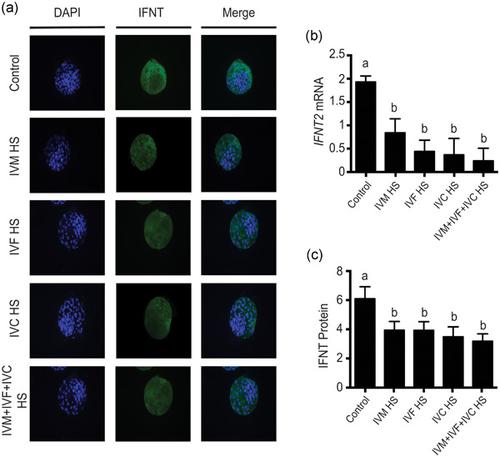当前位置:
X-MOL 学术
›
Mol. Reprod. Dev.
›
论文详情
Our official English website, www.x-mol.net, welcomes your feedback! (Note: you will need to create a separate account there.)
Heat stress on oocyte or zygote compromises embryo development, impairs interferon tau production and increases reactive oxygen species and oxidative stress in bovine embryos produced in vitro.
Molecular Reproduction and Development ( IF 2.5 ) Pub Date : 2020-08-06 , DOI: 10.1002/mrd.23407 Carolina S Amaral 1 , Júlia Koch 1 , Eduardo E Correa Júnior 1 , Kalyne Bertolin 1 , Lady K S Mujica 1 , Mariani F Fiorenza 1 , Suzan G Rosa 2 , Cristina W Nogueira 2 , Fábio V Comim 1 , Valério V M Portela 1 , Paulo B D Gonçalves 1 , Alfredo Q Antoniazzi 3
Molecular Reproduction and Development ( IF 2.5 ) Pub Date : 2020-08-06 , DOI: 10.1002/mrd.23407 Carolina S Amaral 1 , Júlia Koch 1 , Eduardo E Correa Júnior 1 , Kalyne Bertolin 1 , Lady K S Mujica 1 , Mariani F Fiorenza 1 , Suzan G Rosa 2 , Cristina W Nogueira 2 , Fábio V Comim 1 , Valério V M Portela 1 , Paulo B D Gonçalves 1 , Alfredo Q Antoniazzi 3
Affiliation

|
Interferon tau (IFNT) is the cytokine responsible for the maternal recognition of pregnancy in ruminants and plays a role modulating embryo–maternal communication in the oviduct inducing a local response from immune cells. We aimed to investigate IFNT production, reactive oxygen species, and oxidative stress under the influence of heat stress (HS) during different stages of bovine in vitro embryo production. HS was established when the temperature was gradually raised from 38.5°C to 40.5°C in laboratory incubator, sustained for 6 hr, and decreased back to 38.5°C. To address the HS effects on IFNT production, reactive oxygen species, and oxidative stress, ovaries from a slaughterhouse were used according to treatments: control group (38.5°C); oocytes matured under HS; oocytes fertilized under HS; zygotes cultured in the first day under HS; and cells submitted to HS at oocyte maturation, fertilization, and the first day of zygote culture. The HS negatively affected cleavage and blastocyst rates, in all HS groups. On Day 7, all HS‐treated embryos showed decrease IFNT gene and protein expressions, whereas reactive oxygen species were increased in comparison to the control. In conclusion, the compromised early embryo development due to higher temperatures during in vitro oocyte maturation, fertilization, and/or zygote stage have diminished IFNT expression and increased reactive oxygen species in bovine.
中文翻译:

卵母细胞或合子上的热应激会损害胚胎发育,削弱干扰素tau的产生,并增加体外产生的牛胚胎中的活性氧和氧化应激。
干扰素tau(IFNτ)是负责反刍动物母体识别怀孕的细胞因子,并在输卵管中诱导胚胎与母体之间的通讯,从而诱导免疫细胞产生局部反应,发挥着作用。我们旨在调查牛体外胚胎生产不同阶段中热应激(HS)影响下的IFNτ产生,活性氧种类和氧化应激。在实验室培养箱中将温度从38.5°C逐渐升高至40.5°C,持续6小时,然后降至38.5°C,即可建立HS。为了解决HS对IFNτ产生,活性氧和氧化应激的影响,根据处理方法,使用了屠宰场的卵巢:对照组(38.5°C)。在HS下成熟的卵母细胞;在HS下受精的卵母细胞;HS下第一天培养的受精卵;在卵母细胞成熟,受精和合子培养的第一天,细胞就接受HS处理。在所有HS组中,HS对卵裂和囊胚率均产生负面影响。在第7天,与对照组相比,所有经HS处理的胚胎均表现出IFNT基因和蛋白质表达降低,而活性氧物种增加。总之,由于体外卵母细胞成熟,受精和/或受精卵期温度升高,早期胚胎发育受损,从而降低了牛的IFNτ表达并增加了活性氧。与对照组相比,活性氧增加了。总之,由于体外卵母细胞成熟,受精和/或受精卵期温度升高,早期胚胎发育受损,从而降低了牛的IFNτ表达并增加了活性氧。而活性氧比对照组增加。总之,由于体外卵母细胞成熟,受精和/或受精卵期温度升高,早期胚胎发育受损,从而降低了牛的IFNτ表达并增加了活性氧。
更新日期:2020-08-28
中文翻译:

卵母细胞或合子上的热应激会损害胚胎发育,削弱干扰素tau的产生,并增加体外产生的牛胚胎中的活性氧和氧化应激。
干扰素tau(IFNτ)是负责反刍动物母体识别怀孕的细胞因子,并在输卵管中诱导胚胎与母体之间的通讯,从而诱导免疫细胞产生局部反应,发挥着作用。我们旨在调查牛体外胚胎生产不同阶段中热应激(HS)影响下的IFNτ产生,活性氧种类和氧化应激。在实验室培养箱中将温度从38.5°C逐渐升高至40.5°C,持续6小时,然后降至38.5°C,即可建立HS。为了解决HS对IFNτ产生,活性氧和氧化应激的影响,根据处理方法,使用了屠宰场的卵巢:对照组(38.5°C)。在HS下成熟的卵母细胞;在HS下受精的卵母细胞;HS下第一天培养的受精卵;在卵母细胞成熟,受精和合子培养的第一天,细胞就接受HS处理。在所有HS组中,HS对卵裂和囊胚率均产生负面影响。在第7天,与对照组相比,所有经HS处理的胚胎均表现出IFNT基因和蛋白质表达降低,而活性氧物种增加。总之,由于体外卵母细胞成熟,受精和/或受精卵期温度升高,早期胚胎发育受损,从而降低了牛的IFNτ表达并增加了活性氧。与对照组相比,活性氧增加了。总之,由于体外卵母细胞成熟,受精和/或受精卵期温度升高,早期胚胎发育受损,从而降低了牛的IFNτ表达并增加了活性氧。而活性氧比对照组增加。总之,由于体外卵母细胞成熟,受精和/或受精卵期温度升高,早期胚胎发育受损,从而降低了牛的IFNτ表达并增加了活性氧。



























 京公网安备 11010802027423号
京公网安备 11010802027423号